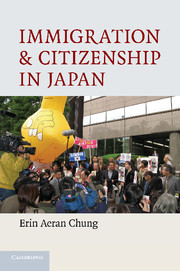Book contents
- Frontmatter
- Contents
- Tables and Figures
- Conventions and Abbreviations
- Acknowledgments
- Immigration and Citizenship in Japan
- Introduction: The Contradictions of Japan's Immigration and Citizenship Politics
- 1 Is Japan an Outlier? Cross-National Patterns of Immigrant Incorporation and Noncitizen Political Engagement
- 2 Constructing Citizenship and Noncitizenship in Postwar Japan
- 3 Negotiating Korean Identity in Japan
- 4 Citizenship as Political Strategy
- 5 Destination Japan: Global Shifts, Local Transformations
- Conclusion
- References
- Index
1 - Is Japan an Outlier? Cross-National Patterns of Immigrant Incorporation and Noncitizen Political Engagement
Published online by Cambridge University Press: 03 May 2010
- Frontmatter
- Contents
- Tables and Figures
- Conventions and Abbreviations
- Acknowledgments
- Immigration and Citizenship in Japan
- Introduction: The Contradictions of Japan's Immigration and Citizenship Politics
- 1 Is Japan an Outlier? Cross-National Patterns of Immigrant Incorporation and Noncitizen Political Engagement
- 2 Constructing Citizenship and Noncitizenship in Postwar Japan
- 3 Negotiating Korean Identity in Japan
- 4 Citizenship as Political Strategy
- 5 Destination Japan: Global Shifts, Local Transformations
- Conclusion
- References
- Index
Summary
Much contemporary literature on political participation in advanced industrial democracies has focused on the vexing problem of declining citizen participation (Fiorina 2002; Schlozman 2002). In particular, this scholarship is motivated by the disjuncture between citizenship policies and citizen political behavior: why don't citizens vote? Meanwhile, scholarship on immigration and racial politics in Western Europe and the United States has demonstrated increasing interest in a similar disjuncture between citizenship policies and noncitizen political behavior: why don't noncitizens naturalize?
Although foreign nationals make up a substantial proportion of the labor force in a number of industrialized societies, their rates of naturalization have been relatively low even among long-term and native-born residents. Tomas Hammar (1990: 22–3) estimated that, by 1987, more than half of the total foreign-resident population in Europe were permanent foreign residents who were eligible for naturalization but remained noncitizens by choice or circumstance. He labeled this category of foreigners “denizens.”
Low naturalization rates especially among permanently settled populations of foreign residents – who are neither full citizens of the host country nor recent immigrants who lack a secure residence status – pose particular dilemmas for liberal democracies. On the one hand, the long-term exclusion of a significant fraction of the population from the rights and duties of full citizenship is untenable for putatively democratic states. Especially as debates about immigration and national identity become increasingly racialized, the line separating de facto and de jure second-class citizens is often blurred.
- Type
- Chapter
- Information
- Immigration and Citizenship in Japan , pp. 28 - 59Publisher: Cambridge University PressPrint publication year: 2010



